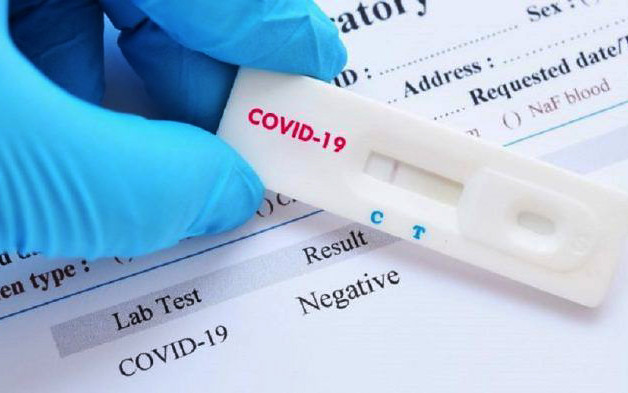29 de octubre 2021

Children of Exile: The Births “Sowing Hope” in the Camp of Nicaraguan Farmers

PUBLICIDAD 1M
PUBLICIDAD 4D
PUBLICIDAD 5D
Three weeks ago, Minsa promised the Pan American Health Organization a report on the current COVID variants. That report has yet to be received

Weekly News Report: a second wave of Covid-19
In May, the Nicaraguan Ministry of Health (Minsa) received the material for molecular screening that can identify the new COVID-19 variants. However, five months after the Pan American Health Organization (PAHO) supplied them with these materials, the Nicaraguan authorities have not yet offered any information on the advance of this screening process.
Sylvain Aldighieri, COVID-19 incident manager for PAHO, affirmed at a press conference on Wednesday, October 27, that they still “haven’t received” the reports on the evolution of the COVID-19 variants in Nicaragua. She did mention, however, that the National Reference Center, part of Nicaragua’s Health Ministry, “are making important efforts to generate the necessary and critical data, not only needed for pandemic vigilance, but also for the scientific community in general.”
On October 13, Ciro Ugarte, PAHO’s Health Emergency Director, noted that Minsa had informed them they were preparing a report on the variants; nonetheless, two weeks following that information, PAHO has still not received the document.
Aldighieri explained that using a sub-regional approach, and thanks to the efforts of some of the Central American countries, “it’s been possible to demonstrate that three of the variants of concern are circulating in Central America: the Alpha, Gamma and Delta strains.”
Aldighieri emphasized the importance of “maintaining and strengthening a sustained genomic vigilance, one that allows us to detect in time the introduction and description of different variants of interest or concern.”
In September, Carlos Saenz, Minsa’s general secretary, declared that in Nicaragua there was yet no confirmation that the Delta Variant of COVID was circulating. However, he didn’t discount its possible presence in the country.
“As in all the countries, we know that a series of variants are circulating. Although we haven’t detected the Delta variant, we’re engaged in studying the genetic sequencing. We’re not ruling out the idea that it could be in circulation, and as such, we must be prepared for that situation,” Saenz stated.
In contrast, doctors from the public and private sector assure that this variant is already circulating in the country. They base this assertion on the changes they’ve observed in the patients’ symptoms, including the speed of contagion and the seriousness of the disease. It’s at present unknown whether the report being prepared in Minsa will be released to the public.
PAHO also informed that, despite some previous delays, a shipment of 305,370 doses of the Pfizer vaccine will soon arrive in Nicaragua. The vaccine lot has been donated by the United States government via the Covax vaccine distribution network that PAHO directs.
“There were some issues with the documentation that the provider had to complete in order to confirm the shipment of the vaccines to Nicaragua. Thanks to coordination between the PAHO teams in Washington and Managua respectively, we were able to speed up the process. The Nicaraguan government provided a rapid response, and the provider now has all the documentation, and all pending difficulties have been overcome. Everything is now ready for the shipment to arrive in the country in the early hours of Friday, October 29,” Ugarte specified.
The donation to Nicaragua, which has maintained very tense relations with the United States in political matters, will permit the vaccination campaign in that country to advance. As of now, under 20% of Nicaraguans are fully vaccinated, according to PAHO.
In the second week of October, Nicaragua received a loan of 100,000 doses of Pfizer vaccine from the government of Honduras. The loan was provided to compensate for the delay Nicaragua experienced in the arrival of the now-pending shipment of 305,370 doses. It’s expected that part of the upcoming donation will be used to return the vaccines loaned by Honduras.
PAHO’s Health Emergency director underlined the importance of the arrival of this type of vaccine shipment in Nicaragua, affirming that the country’s vaccination coverage remains very low.
The doses will arrive on board an airplane that’s expected to depart from Miami on Thursday, October 28, and arrive at Managua’s international airport early Friday morning.
This article was originally published in Spanish in Confidencial and translated by our staff
PUBLICIDAD 3M
Confidencial es un diario digital nicaragüense, de formato multimedia, fundado por Carlos F. Chamorro en junio de 1996. Inició como un semanario impreso y hoy es un medio de referencia regional con información, análisis, entrevistas, perfiles, reportajes e investigaciones sobre Nicaragua, informando desde el exilio por la persecución política de la dictadura de Daniel Ortega y Rosario Murillo.
PUBLICIDAD 3D